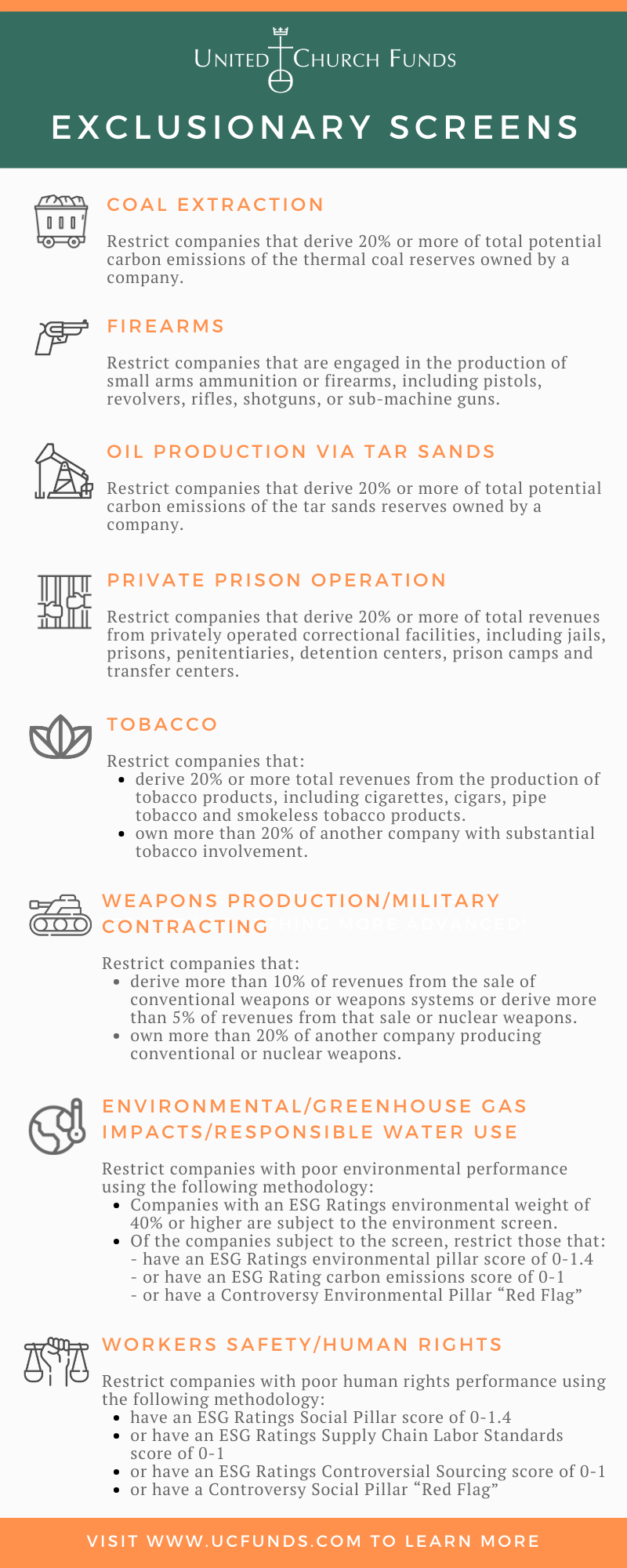Faith and values-based investors use exclusionary screens to avoid profiting from business activity that runs counter to their moral and ethical codes. Although some conventional investors argue that these screens are ineffective and costly, in our experience managing responsible investment funds, screens have added value to our clients’ portfolios.
We agree with those investors who argue that divesting limits your ability to influence a company. Therefore, we view screening as a last resort of all the tools in the Responsible Investor Toolbox.
Three years ago, United Church Funds (UCF) adopted an updated Exclusionary Screens Policy[i] that was developed by an expert task force[ii] of theologians and investment professionals. This revised policy focused on Justice and Sustainability – two themes that emerged as priorities for our clients, guided by over five decades of investment policy discernment in the United Church of Christ (See Timeline).
As UCF portfolios are actively managed with unique constraints, the impact of screens must be assessed from several dimensions. The Beyond Fossil Fuels (BFF) portfolio uses the most comprehensive screening list at UCF because it screens out companies with evidence of fossil fuel reserves, in addition to the exclusionary screens that are applied across every UCF fund portfolio. Combining these two lists adds up to 738 screened companies. The BFF’s two benchmarks, one constrained and one unconstrained, illustrate the impact of UCF Exclusionary Screens on this portfolio.
3-Year Return (ending June 30, 2020):
6.42% – Benchmark 1: MSCI All Country World IMI Index ex Restricted Securities
5.55% – Benchmark 2: MSCI All Country World IMI Index (without screens)
0.78% – Annualized Excess Return
We also find excess returns in our portfolios that do not avoid companies with fossil fuel reserves. Comparing the State Street Screened S&P 500 portfolio, a passively managed portfolio that uses UCF’s basic Exclusionary Screens (see infographic), with the unconstrained S&P 500 index returns also shows a positive benefit.
3-Year Return (ending June 30, 2020):
8.05% – State Street Screened S&P 500 (net)
7.51% – S&P 500
0.54% – Annualized Excess Return
UCF’s clients should celebrate these results. Applying moral limits to investment diversification not only helps our clients align their investments with their faith but makes good investing sense. While there is no guarantee that these screens will always boost investment performance, we have good reason to believe they will not hurt our clients’ performance over the long run.
[i] With this update, UCF made the following changes to its Exclusionary Screening Policy:
- Removed Screens: Alcohol and Gambling
- Added Screens: Private Prisons and those companies with failing grades on Human Rights or Environmental Impact

[ii] Members of the Task Force included: Brian Bodager, Pension Boards Staff and UCCB Investment and Endowment Committee; Charles Buck, UCF Board; John Dorhauer, UCC Collegium; David Greenhaw, Seminary President; Don Hart, UCF Staff; Dick Harter, UCCB Investment and Endowment Committee; Sandy Hulse, UCF Board and UCF Social Responsibility Committee; Steve Jones, UCC Staff; Nesa Joseph, UCC Board, UCF Board and UCF Investment Committee; Ann Kiernozek, UCC Staff; Dave Klassen, UCF Staff; Katie McCloskey, UCF Staff; Jim Moos, UCC Collegium; Mark Parthemer, UCF Investment Committee; UCF Board; Noah Jensen Tabor, UCCB Investment and Endowment Committee; Yvette Wynn, UCCB Investment and Endowment Committee and UCF Investment Committee.